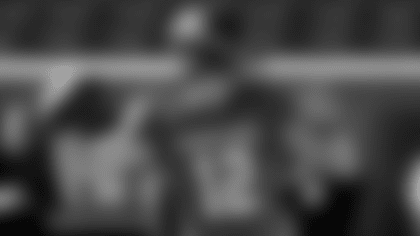As the calendar flips to training camp and the preseason slate, a grueling six-week period commences for coaches and players alike. Work put in during the perpetual, long summer days fosters growth on the gridiron, creating a foundation for the strenuous upcoming 18-week regular-season NFL schedule. As countless on-field practice drills and classroom instruction sessions blend together, endurance is fashioned.
Many football fanatics know the concept of training camp from a theoretical perspective, but few grasp all of what it encompasses. Next up in the 'Day in the Life at Training Camp' series, Buccaneers Running Backs coach Skip Peete is spotlighted. From his coaching philosophy and adherence to differing learning styles, to film evaluation of the multi-faceted position, Peete provides a comprehensive and insightful dive into the NFL coaching circuit.
Coaching in the NFL goes far beyond the sidelines, from developing game plans to cultivating a winning culture in the positional room. NFL coaches nurture talent, instill discipline and mentor players to foster an environment that spurs long-term success. To understand the wholehearted pursuit of a dream, one must first learn the origin story of the individual.
…
With the faint echo of football pads colliding on TV and the smell of coffee permeating in the office, Skip Peete reclines in his chair behind a desk overflowing with stacks of play sheets. As the words "coaching philosophy" resonate, he speaks candidly, revealing the true nature of being a breakthrough architect on sports' grandest stage.
Coaching Philosophy
Skip Peete has been coaching for 35 years and enters his 25th season in the NFL as the Buccaneers running backs coach in 2023. He has previously coached for four different franchises, including two stints with the Cowboys (2007-2012, 2020-2022), and one with the Raiders (1998-2006), the Bears (2013-2014) and Rams (2016-2019). Peete started his coaching tenure as a graduate assistant for the University of Pittsburgh, igniting a passion that has lasted for three decades. Before transitioning to the NFL, Peete coached at four universities, including Pittsburgh, Michigan State, Rutgers and UCLA. At those stops, his primary experience came as a running backs coach; however, he served as the wide receivers coach at Michigan State and Rutgers.
Peete, a Phoenix, Arizona native, grew up with football coursing through his veins. He is the brother of former NFL quarterback Rodney Peete and his father, Willie Peete, coached running backs for the Bucs from 1992 to 1994 before moving to the scouting department. He was exposed to the game at an early age, engendering a voracious desire to compete. Peete, the product of a coach and an elementary school teacher, had hard work instilled in him as a child by his parents' moral compass.
"First and foremost, my father said he didn't want me to get into coaching, because he said, 'You will never see your family,'" Peete recalled. "I can remember him never seeing me when I played little league baseball and Pop Warner Football, and he didn't see any of my high school football games because he was working. So, he said, 'Why would you want to do that?' But I had a college coach that I played for at the University of Kansas named Mike Gottfried and he said, 'I know you don't want to coach but I think you would be good at it because of how you played and what you did on the field. You were basically like a coach on the field.' So, as a coach's kid, you are obviously taught to study and get prepared, and probably more than your typical athlete would be. I think the thing that really helped me balance between school and playing was my mom was an elementary school teacher and my dad was a football coach and your homework had to be done before you could go outside and play. So, at a young age, she impressed upon my brother and I, before I went outside to practice or play, I had to have my homework done. That goes into what I do now."
For Peete, the goal of being a coach has always been to unlock a player's potential to maximize their own performance on the field, while also shaping men of character off the field. With an open-door policy, Peete's desire is to personify whatever role the player needs, whether it is a father, a friend, a mentor, or a psychologist. In some instances, he takes the form of multiple roles. The desire to not only inspire but to encourage became the driving force behind Peete's occupational journey.
"As a coach, the main thing that I wanted to do is to be able to help young men have success in their life once they left football," Peete stated. "Football is a lot like life. You are going to get kicked around and fall down but you still have to get back up and that was probably the most important decision I made when I tried to decide if I wanted to be a coach. It was all about helping young men become a better version of themselves and not just as a player, but all around as a man. That is what drove me to do this. I have been fortunate to have a lot of talented players that I have coached over the years and a lot of them had that instilled in them during their upbringing, to where nothing happens easily or with happenstance. You have to work for it and create it. The way you create it is by your preparation and your study to get ready and perform on gameday. Once you instill that in your players, I think they eventually get it.
"I would say I am a fair coach. I demand a lot but once you teach them how to do it and then they have success, then they understand, 'Hey, you are helping me.' You learn over the years: It is not always 'I am right and you're wrong.' The footwork and timing of a run play has to be precise because it has to match the line, otherwise it won't be successful, but everyone is built differently. You can't be rigid because sometimes, physically, someone may not be able to do something you are asking them to do, and you don't want that to happen. You want them to feel comfortable and to be confident in order to have a successful play. It is a give and take and there is a lot of communication between player and coach. You put in a scheme, you put in the plan, you put in the play, and everyone runs something similar, but they may have a different way of doing it. Then, you have to adjust with who you have. Just because a player ran a certain play one way and had success with it, you have to adjust it to the person you have and how they can be successful with it. Rachaad White and Sneak's [Ke'Shawn Vaughn] footwork might look the same, but Chase Edmonds' might look a hair different with his height and stride.
"At the end of the day, I am not playing. They are playing. I have to put them in the best position so that they can have success. They have to be confident in doing it. We are putting in a new scheme and a new offense and these guys have not run that. It's new to them so you explain it and they want to try it. So, then they say, 'Why am I doing this?' I say, 'You have to help the linemen do their jobs. I know you want to run over there but you need to press it to this point to move guys there so they can get blocked so you can go there.' There are not big lanes in the NFL. There are small creases, and we have to get there at the right time, otherwise, they close up. There are a lot of moving parts. I enjoy it."
When Peete was in Oakland, Tyrone Wheatley and LaMont Jordan recorded career bests in rushing yards during the 2000 and 2005 seasons, respectively. In 2007, Marion Barber made his sole Pro Bowl appearance in Peete's first year as the Cowboys' running backs coach. Then, in 2009, the Cowboys' running back room averaged a franchise-record 4.8 yards per carry. During his stop in L.A., Peete guided Todd Gurley to reach new heights in an option-based mid zone run scheme. Gurley received Offensive Player of the Year recognition and first-team All-Pro honors in 2017 and was an All-Pro again in 2018.
Most recently, Peete aided the development of Tony Pollard, who broke through for a career-high yards from scrimmage metric en route to a Pro Bowl nod in 2022. Now, Peete joins the Buccaneers' coaching staff, looking to rejuvenate the NFL's worst-ranked rushing attack last season.
"They were making a change in Dallas and then I got a call from Todd," Peete explained. "Todd and I worked together in Dallas back in 2007 and he said that he was going through some coaching changes, and he was trying to compile a list of possible candidates for some of the positions/people that would not be retained here. I kept in contact with him, and I always respected him as a coach. I always thought he was upfront and honest and a hell of a football coach. I always thought it would be great to work with him again and to coach for him. When the opportunity presented itself, obviously, I thought it would be a great deal here. I thought it would be a great place to live and a great place for my family with us relocating. All those things played into it."
Routine
A typical daily rundown (practice time and duration change based on the day):
o 6:00-8:15 AM: Breakfast Available
o 6:30 AM: Training Room Open
o 7:15-7:35 AM: Coaches Meeting
o 7:45-8:05 AM: Team Meeting
o 8:30-10:10 AM: Practice (10-minute warmup/90-minute practice)
o 10:00 AM-1:45 PM: Lunch Available
o 11:45-12:25: Lift (Specialized groups)
o 12:40-1:20 PM: Lift (specialized groups)
o 12:45-1:45 PM (Special Teams Meeting)
o 1:45-1:50 PM: Team Meeting
o 1:55-4:20 PM: Offense/Defense Meetings
o 4:30-5:45 PM: Walk Thru
o 5:15-6:45 PM: Dinner Available
o 11:00 PM: Curfew
"My alarm goes off at 5 a.m.," Peete explains, as he grabs a fresh cup of coffee from the Keurig in his office. "I am usually in the car by 5:15-5:20. I get up, quick rinse, I'm out the door and I am usually here by 5:45. Then, I usually go through my checklist for the day and if there are any reminders that I need to give to the players for that day. If there are new things that will be introduced, I have to make sure that I have a video of it to show them and a visual of it being run. The more you see it and run through it, then, I can just put it in a diagram for them. 'We are running this. This is how we are going to block against this front and if they change the front, this is what we have to do.' They need to know that, but they also need to know how they have to affect the defenders by their angle of departure, the press for the play to set the second level defenders and the offensive linemen who are double-teaming the down linemen and who can get ready to come off to the second level guy. Then that creates lanes in the defense and that is when you have holes in the defense that we can run though. Those are the things that I have on my checklist and then usually it is a staff meeting at 7.

"Then, we go through practice and then team meeting at 7:45 and that goes until 8:30 and then you have to plan your individual practice session time of what you need to work on with the players to get ready for practice. Usually, mine are things we need to do to improve on whether it is technique or fundamental things within a play or within a blocking scheme. So, sometimes you will see us in the bags – that is primarily to get guys loose but to also work on footwork and change-of-direction and balance. Then, we get into more specific things like working on pass protection technique on the approach, setting of the feet, punch and then the second and third reaction. Everyone makes the initial block but then the guy moves, so you have to react to his second reaction and then also a third to sustain the run. I have always felt pass protection is primarily heart, effort and technique. Some guys can do it better than others but at this level, if you cannot pass protect, it is very hard for you to stick around. If you show signs of weakness, then they will say, 'Ok, we have to blitz this guy because he cannot block.' But once you show that you are a sound, fundamental pass protector, they don't blitz you. We have to do it to hopefully create one-on-one matchups along the front line. Those are the individual periods working on fundamentals and we will also ball handle the run plays with the quarterbacks so we can get the right course, the right track, the right read and the quarterback knows what angle and where he needs to open to get the handoff to us."
Videos of drills often monopolize social media channels during camp as fans clamor to find any way of seeing the representatives of their favorite team back in action. But similar to a play in football after the snap - every movement is methodically detailed down to a split-second - drills are designed to specifically target areas of growth within the position group. Based on the previous day of practice and what he finds on tape, Peete engineers a plan to cultivate growth, propelling players to well-rounded status. Then, practice begins and players have the opportunity to showcase on the grass what they have absorbed.
"Then from there, it is all teamwork, it is 11 guys working with 11 guys. That is where you have to know where you fit within the play, whether it is a run or a pass and what is your responsibility based on the play or the team you are facing. Aaron Donald can wreck a game. So, pass protections are, 'Go through your eye progression of who you are responsible for and then you check whoever Aaron Donald is over to see if that guy needs help. If he is good, then you get out and run your route. If he is not, then you have to stay there and help him.' Those are all game adjustments we have to make based on who we are playing. That is kind of a day. After practice, us as coaches, we will grab a bite to eat and bring it in to watch the practice film so that when we review it with the players, we already know what we are getting ready to say because we have seen it. There is always something that you have to correct. Once that day is over, then you start preparing for the next day."
In many ways, Peete is similar to a professor. He prepares players for the ultimate exam on Sunday under the lights. Then throughout the week, there are periodic quizzes that pop up in the form of practice. In the classroom, Peete explains the objective and two hours later, they have to put it all together on the grass. The true test is production in games and adjustments. There could be carryover depending on the structure of the opponent's defense, but formations and motions will likely change on a week-to-week basis. From first and second-down situations to situational scenarios, everything is calculated to formulate a plan of attack. From the snap of the ball, a chess match ensues. Countless hours of work contribute to one successful play. Peete analyzes extensive game footage and collaborates with the staff to develop strategic approaches that are tailored to each opponent, leveraging the Bucs' strengths and personnel.
"I think to have success in the pro game, you need to know as much as you can about your opponent and his mannerisms. Is he an aggressive guy? Is he fast downhill? Is he quick to take on a lineman or a back? Or is he a sit back and react guy? You have to look at yourself as well. Have to ask yourself, 'When I run the ball, is my tempo different than when we play-action?' It has to look the same, for them to say, 'Oh it is a run. No, it's a pass.' Now, those two steps may have gotten them out of position. You have to self-scout to make sure you are not giving tips to the defense, whether it is a run or a pass and whether you are getting the ball or not getting the ball. Everything is looked at and you have to be conscious of that. If you wipe your hands on the towel if you are getting the ball, you have to wipe your hands every time you break the huddle."
Film Preparation/Adjusting to Differing Learning Styles
Every player in the running back room learns and responds in a different way to the information being presented. Peete has to adapt and tailor his coaching style to contrasting personalities. First, he has to identify each player's preferences on communication, motivation and feedback to match their strengths. Some are more analytical, while others are creative and intuitive. Some are visual, while others retain information and process through auditory, kinesthetic, and verbal input. Then by understanding the styles in the room, Peete can find the best method of presenting the material for comprehension.
"My way of doing it is knowing everyone in that room because their personality types are different, and you have to figure out how they learn," Peete remarked. "Some guys are visual, and they have to see a video of it. Some guys can see diagrams, and some guys need the visual and then need to go out and walk through it to really grasp what you are talking about. Then some need all three: to see the diagrams, see the video and then they have to walk it. But you have to do whatever you can to have them ready at the end of the week. You build it in to where it gets everybody on the same page, because you do not want to draw someone out individually and say, 'Ok, this is for you.' We are all in the same meeting, so you touch on all three aspects during that timeframe and then they have to make the right decision based on the reaction of the defense. The first play is always the same thing, but it Is the second or third reaction by the defense that the players have to adjust to make the play right. You have to physically respond to the reaction, so it makes it an interesting game that way.
"I always tell them, 'Every day of practice and every play is an opportunity for you to showcase who you are and what you are about.' Because everybody watches everybody's game, they are not just showing us what they can do, they show the league. When someone gives you an opportunity, you have to grasp it with both hands and not let go. You have to make it difficult for anyone to say, 'He doesn't deserve to be here.' I am new and I formulate my own opinion on the players in the room. I tell them daily, 'You have to work every day to improve your skill level as a running back, but you can't do everything in one day. Whether its fine-tuning hand placement in pass protection, and the next day maybe footwork, and the depth and the speed of pass routes and by the end of the week, you have improved on every one of those areas. If you are confident, the person next to you will be. There are always going to be teams more talented than you and teams that we are more talented than, but at the end of the day, it all comes down to poise, confidence, and execution."
Complacency is the thief of progress and Peete works to impart daily development through a detail-oriented approach. Most athletes have the baseline desire to win but work ethic and dedication is what differentiates average from elite. When evaluating and analyzing film from games, Peete focuses on every single nuance to foster craft maturation, from depth of routes to footwork. Like watching a movie, Peete re-plays the matchup multiple times for a comprehensive breakdown of each play, distancing the emotional aspect from an electric win or a devastating loss.
"After the game, I am trying to grade it," Peete said. "Did they utilize the proper technique and the proper footwork, the proper depth on their routes? Did they identify the proper defender that they are responsible for in pass protection? Once you got through the game and you watch it, usually I watch it twice because usually the first time through, you're still a little antsy from the game whether you won or lost. You always want to be fair to the player and not be judgmental. You find more and more things the more times you watch it, like maybe a linebacker was in a gap that forced the runner to deviate from his course a little bit. The biggest thing after the game is just seeing if my players did the correct thing. Or, what caused them to do something they should not have done and how do I correct it."
Rachaad White Skillset/Intricacies of the Position
Peete has coached several dynamic backs throughout his career including Barber, Gurley, Pollard, Felix Jones, Matt Forte and Ezekiel Elliott, to name a few. Now, he will inherit second-year player Rachaad White in the Bucs' running back room. White is an intriguing mix of size and athleticism. He is patient in his run tempo, setting up blockers. White's balance and body control allow him to run through arm tackles and get to the second level. The Arizona State product is dangerous as a receiver and his vision allows him to be effective in different blocking schemes. The Bucs have installed a revamped offensive system under Dave Canales and White will be a focal point in 2023. The system will aim to marry the run and the pass game, utilizing quarterback bootlegs and scrambles, wide and mid zone with the offensive line moving laterally and motion to ignite the run game, stimulating play-action. The different elements will work cohesively to get playmakers in space.
"I think his run style – he did some of these things in college – the mid zone, the outside zone, and power running game," Peete detailed. "I think all those things that we are implementing are things that he has had experience with, but he has a good feel of running them. I think that is what is going to help him. He is in a system that I think the running back can thrive in. It is similar to the L.A. Rams' offense in the scheme factor and some of the guys that I coached there, you have examples to show the 'why.' Every guy is different and what makes one guy great may not make the other guy great. So, you have to make your own niche. The people that have the most success, they put in the most time. As a pass-catcher, White just has a very calm feel on how to run routes that a lot of times running backs do not necessarily have. Not only running back routes, but I think he is a guy that is capable of moving into a wide receiver position and capable of running receiver routes and not every running back can do that. He has good hands and the times that he doesn't catch it, it's not that he doesn't have the hands to do it, it was the lack of concentration on, 'I am trying to make something happen before I catch it.' Looking away before he had the ball to see what he would do next. It is not that he just dropped it. He has a good understanding of how to run routes and how to us leverage and how to create separation."

White is a player that can generate mismatches on the field, with defenses being forced to drop a linebacker or safety to cover him when he lines up in the slot. In the modern era of the NFL, being "versatile" no longer has a negative connotation but is instead, a prerequisite to surviving at the pro level. In order to be part of the upper echelon, running backs have to be able to do all three: carry the football in the running game, run routes out of the backfield and block in the passing game as an extension of the offensive line. Otherwise, a player becomes one-dimensional, which gives the defense a tell.
"If you cannot pass protect then when that player is in, they know it will be a run," Peete stated. "Or if you have a guy who is a tremendous route runner, but they rarely utilize him as a runner, then they know it's going to be a pass. When you have a guy that can do all three, it puts more pressure on the defense. That is the thing that young backs have to understand. It is not just running the ball. That is the area that young backs really have to improve on in my opinion is pass protection. Some systems in college do not utilize them that way so they are never really trained. So, we have to train them to make sure they are capable of doing all three to the best of their ability. The player also has to be willing to recognize and to want to improve his game."
Peete leans on the desk and grins, dedicated to unlocking hidden potential in others. Despite the numerous sacrifices that come with the job, his face beams with pride at the totality of shaping lives both on and off the field.
























